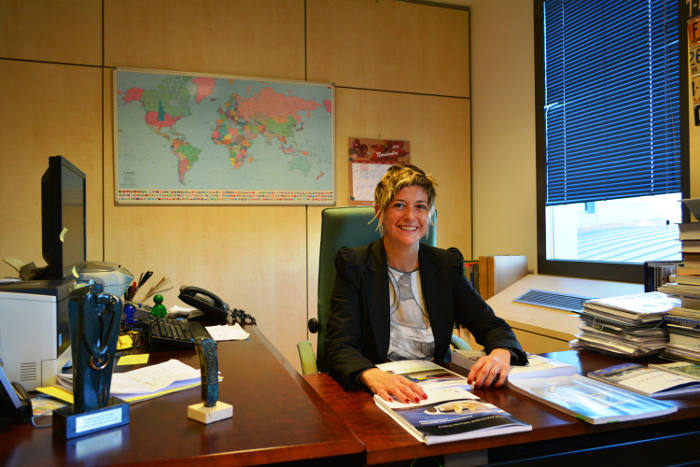-
18 November 2016
Category : Interview
The DGT’s work in international cooperation
Carmen Girón, Head of the International Relations Area of the DGT and coordinator of the Twinning project between Algeria and Spain, tells us about the work of the DGT in the international cooperation project in Algeria.
 Carmen Girón, Head of the International Relations Area of the DGT
Carmen Girón, Head of the International Relations Area of the DGTThe 20th is the third Sunday in November and, as every year, it is the World Day of Remembrance for Road Traffic Victims, a date established by the United Nations to commemorate traffic accident victims and their families. Reducing the number of traffic accidents is also one of the goals of the European Union.
In 2010, the European Commission adopted the Road Safety Action Plan with the aim of halving the number of traffic accident victims by 2020. The road safety project in Algeria arose within the framework of this action programme. Carmen Girón, Head of the International Relations Area of the DGT is the coordinator of the Twinning project in Spain.
What is the overall objective of the project in Algeria?
It is a Twinning project funded by the European Commission within the good neighbour policy with other countries. And specifically what it seeks to do is to enhance and support road safety policies through twinning, in this case with our colleagues, the Algerian authorities in charge of promoting road safety in their country.
What are the expected outcomes of this project?
This Twinning can be specifically explained in five outcomes, because that’s how it was designed by the European Commission and subsequently agreed upon reciprocally between Algeria and Spain.
A first macro outcome refers to the organisation, the foundation and the base for making it work to address how this organisation should be structured, what powers it should have, how to coordinate with other bodies at the national level, and what legislation is to be developed.
A second step is to have reliable information about the number of accidents and the accident rate in the country. Data that can be utilised by the public authority responsible for promoting road safety is fundamental and, this being the case, Spain is playing an important role, because of its experience, in relation to Algeria. And we are working hand in hand with them, advising them on how to collect, process and analyse the data in the case of a traffic accident in order to be able to ultimately establish a policy at the national level.
A third area is everything related to the safety conditions of people who participate in road traffic. In this case, particular attention is paid to drivers, addressing the training they should have in order to obtain driving licenses, covering theoretical and practical content and the methodologies to be used for giving tests.
There is also a very concrete aspect which is driver education extended to the entire population linked to road safety awareness campaigns.
Lastly, there is the outcome that addresses legislation and the technical procedures for inspection for upgrading vehicles, that is, to ensure that they meet the necessary technical requirements for safe driving, and treatment of the risks associated with road infrastructure.
What is the action framework for the project?
At the international level, it is under the reference framework of the Decade of Action for Road Safety 2011-2020, which is always understood as an umbrella of a policy for promoting road safety within the scope of the EU’s international cooperation.
Are there any outcomes to be highlighted?
We have now reached the midpoint of the Twinning project, and training and technical assistance missions have been carried out by expert Spanish civil servants, mainly professionals working in the Directorate-General of Traffic and the Civil Guard Traffic Group. Moreover experts from the Ministry of Public Works and Transport, the Ministry of Industry and city halls will be joining in.
What is the work of the Directorate-General of Traffic internationally?
It participates actively in all the international technical groups for improving road safety. In the WHO global status reports on road safety from 2013 and 2015, Spain is ranked in the top tier of countries with the best road safety in the world, which is no obstacle against continuing to work to achieve even better levels of road safety.
Additionally, in international cooperation it is responding to the request of the UN Secretary General that the countries with the best road safety situations lend other countries a hand, as other countries did with us in the past. And so, for example, in 2011, the UN specifically highlighted the protective work of the DGT with other countries, particularly in Latin America, to promote and improve road safety.
It also should be remembered that we are not just working in Latin America or within the scope of the EU. We also respond to bilateral requests from countries that are identified as priority and strategic for Spain’s external action, something that is set by our Ministry of Foreign Affairs.
The views and opinions expressed in this blog are the sole responsibility of the person who write them.






